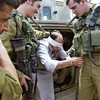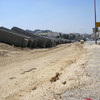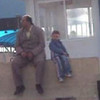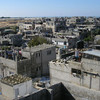
In recent days, land requisitioning orders were issued for areas south of the Ma’aleh Adumim settlement in order to build the Separation Barrier. The Barrier around Ma’aleh Adumim and the adjacent settlements will encompass 74,000 dunums, and will further restrict the freedom of movement of hundreds of thousands of Palestinians between the northern and southern portions of the West Bank. Some 30,000 residents of the villages Abu Dis and al-‘Azzaariya will live in an enclave surrounded by a wall on three sides. Building the Barrier along the current route continues Israel’s policy of severing East Jerusalem from other parts of the West Bank. Read more about Construction moves forward on Barrier around Ma'aleh Adumim

On 27 July 2005, the Knesset amended the Nationality Law. The amendment restricts the family unification of Israeli citizens and residents, including residents of East Jerusalem, and Palestinians living in the occupied territories. The law does not apply to Israelis who apply for a legal status for their foreign spouse who does not live in the Occupied Territories. Couples who decide to reside together in Israel or in East Jerusalem in violation of the law, are unable to live a normal life and are in constant fear. If they decide to live in the occupied territories, the spouse holding an Israeli identity card violates the military commander’s order prohibiting Israelis to enter areas under Palestinian security control. Read more about Knesset Enacts Racist Law

The Knesset’s Law, Constitution and Justice Committee voted today (Monday) to approve the amendment to the Civil Wrongs Law. The amendment is intended to almost completely exempt Israel from paying compensation to Palestinians injured by the security forces. On Wednesday, the Knesset plenary will vote on it for the second and third readings, necessary to enact it into law. The amendment applies to ” residents of a conflict area” and “subjects of enemy states.” The Government has clearly stated its intention to apply the new law to Palestinians in the Occupied Territories. If the Knesset passes the new amendment, it will almost completely block the ability of Palestinians to file for compensation. Read more about Knesset to decide on Wednesday whether to block Palestinian compensation suits

Today, Palestinians are not able to sue the state for damages caused by combatant activity, broadly defined as, “…any action of combating terror, hostile actions, or insurrection, and action intended to prevent terror and hostile acts and insurrection committed in circumstances of danger to life or limb.” If the Knesset passes the new amendment to the Civil Wrongs Law, intended to excempt Israel from paying compensation to Palestinians injured by the security forces, it will almost completely block the ability of Palestinians to file for compensation, even for damage caused by illegal shooting, looting, negligence on training grounds, abuse and degrading treatment at checkpoints, or physical violence. Read more about Israeli government proposes blocking Palestinian compensation suits

Israel’s High Court of Justice issued a temporary injunction ordering the government to cease construction of the wall south of a-Ram village, northeast of Jerusalem, until arguments for a petition against the wall are heard. Initially, Israel decided to erect this section of the wall along the Jerusalem municipal boundary, as it was fixed following the annexation of the city’s eastern part in 1967. However, in response to the petition of several institutions situated in Dahiyat al-Barid (southern a-Ram), Israel elected to shift the route of the barrier northward, which would isolate part of the neighborhood from the rest of the village. Read more about Israeli High Court freezes building of the barrier in Dahiyat al-Barid

In the southernmost West Bank, some one thousand Palestinians have maintained the way of life of their ancestors: living in caves and earning a living from farming and livestock. In the 1970s, the Israeli military commander declared the area a “closed military area,” and for the past five years, Israel has been trying to expel them from the area. In a new report, B’Tselem shows that Israel has continually sought to annex the area and expand the nearby settlements. The cave residents are victims of violence and property damage from the residents of nearby settlements. Due to the intensity of this violence, the residents of two villages to abandon their villages in 2000. Read more about Means of Expulsion: Violence, Harassment and Lawlessness Toward Palestinians in the Southern Hebron Hills

The Israeli government has proposed an amendment to the Civil Wrongs Law intended to exempt Israel from paying compensation to Palestinians injured by the security forces. The amendment applies to ” residents of a conflict area” and “subjects of enemy states.” Israel has clearly stated its intention to apply the new law to Palestinians. Today, Palestinians are not able to sue the state for damages caused by combatant activity, broadly defined as, “…any action of combating terror, hostile actions, or insurrection, and action intended to prevent terror and hostile acts and insurrection committed in circumstances of danger to life or limb.” If the Knesset passes the new amendment, it will almost completely block the ability of Palestinians to file for compensation, even for damage caused by illegal shooting, looting, abuse and degrading treatment at checkpoints, or physical violence. Read more about Israeli government proposes blocking Palestinian compensation suits

During the second intifada, Israel formally adopted a policy of assassinating Palestinians suspected of membership in armed organizations waging battle against it. In an attempt to counter the sharp criticism against this policy, Israel argued, among other things, that targeted assassinations were only carried out when it was unable to apprehend the persons targeted for assassination. According to B’Tselem’s figures, since the beginning of 2004, Israelis security forces have killed eighty-nine Palestinians during operations that the defense establishment refers to as arrest operations. At least seventeen of the persons killed were not wanted by Israel, but were civilians who were not suspected by Israel of having committed any offense. In addition, at least forty-three of those killed were unarmed, or were not attempting to use their arms against Israeli security forces at the time they were killed. None of these cases were investigated. Read more about Take No Prisoners: The Fatal Shooting of Palestinians by Israeli Forces During Arrest Operations

For the past four and a half years, Israel has severely restricted freedom of movement to and from the Gaza Strip. These restrictions further strangled the Gaza Strip, so much so that the area resembles one gigantic prison. One Big Prison documents the ongoing violations of human rights and international law resulting from Israel’s restrictions on the movement of people and goods between Gaza and the West Bank, Israel, and the rest of the world. The report also warns against Israel’s attempt to avoid its responsibility toward residents of the Gaza Strip following disengagement. B’Tselem portrays affected people. Read more about Video testimonies: One big prison

Israel has cut off the Gaza Strip from the rest of the world to such an extent that it is easier for Palestinians in Israel or the West Bank to visit relatives in prison than visit a relative in Gaza. This is one conclusion of the 100-page report that B�Tselem and HaMoked publish today. One Big Prison documents the ongoing violations of human rights and international law resulting from Israel�s restrictions on the movement of people and goods between Gaza and the West Bank, Israel, and the rest of the world. The report also warns against Israel�s attempt to avoid its responsibility toward residents of the Gaza Strip following disengagement. Read more about New Report Warns Against Continued Strangulation of Gaza Strip after Disengagement










